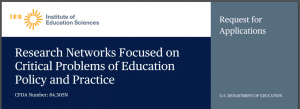U.S. Department of Education Announces Grants to Advance Education Research With Digital Learning Platforms
CompetencyWorks Blog

The Institute of Education Sciences (IES) has released a Request for Applications (RFA) for its Research Networks Focused on Critical Problems of Education Policy and Practice grants. One of the two programs it covers is “Digital Learning Platforms to Enable Efficient Education Research Networks,” with grants of up to $2 million for a five-year grant period.
The IES grant provides an opportunity for digital learning platforms whose features facilitate competency-based education to enhance their ability to conduct rigorous research on student outcomes. Notably, in addition to the traditional outcomes that all schools are accountable to, the grant permits investigation of deeper learning outcomes such as higher-order thinking and the “social and behavioral competencies [including] the social skills, attitudes/emotions, and behaviors that are important to learners’ success in school and beyond.”
The grant establishes a network of up to five digital learning platforms, plus a network lead. The goal of the network is “to leverage existing, widely used digital learning platforms for rigorous education research.” As explained in the RFA, “Education research is often a slow and costly process. Even more difficult is replicating research in a timely and cost-effective way to ensure that findings are meaningful for the wide range of contexts and populations that make up our nation’s education system. Conducting research through widely used digital learning platforms may accelerate the research enterprise and make it easier to conduct replication research….These platforms may also facilitate broader participation from educators interested in education research….Successfully achieving this goal requires a network of education technology industry leaders and developers, education researchers, and education practitioners. This Network will provide an infrastructure to facilitate these collaborations.”
A common misconception equates competency-based education with flexible pacing alone, often with an overreliance on digital learning platforms that enable flexible pacing but minimize the role of the teacher and the classroom environment. In fact, competency-based education is a comprehensive set of cultural, pedagogical, and structural changes to the traditional system. However, technology products such as learning management systems and digital learning platforms do play key roles in managing information, monitoring and recording student progress, and increasing access to digital curriculum in most or all high-quality competency-based schools.
To be considered for the IES grants, digital learning platforms must already have more than 100,000 users in K-12 schools or postsecondary institutions, the ability to engage learners in a variety of specified activity types, and the ability to collect multiple types of user data. Each grantee team will then enhance features of their platforms to expand their capacity to conduct multiple types of research such as large-scale efficacy and replication studies and “feedback loops that use the data collected through the platform to identify and improve the implementation of core components of interventions and contribute to theories about how people learn.”
Teams will also engage in leadership activities to “discuss challenges such as data privacy, collaboration tools, and the types of meaningful outcomes that can be collected by platforms that would be useful for practitioners.” Through a subsequent grant competition, the research teams will also have the opportunity to conduct the studies that their platforms were revised to accomplish.
These types of studies hold great potential to advance the evidence base for K-12 personalized learning. The Aurora Institute strongly encourages the digital platforms that work closely with competency-based schools to pursue this opportunity. Letters of intent are due to IES on January 7, the application deadline is February 25, and start dates are in August 2021. Feel free to contact us as thought partners or collaborators in relation to our knowledge of competency-based education, digital learning, and research design.
Learn More
- Request for Applications
- Grant Announcement in Federal Register
- What Is Competency-Based Education? An Updated Definition
Eliot Levine is the Aurora Institute’s Research Director and leads CompetencyWorks.